By Lucy Komisar
If only the radical Islamists were just like the people who run the West, capitalists! If you think that‘s the answer, be careful what you wish for. Ayad Akhtar‘s clever, ironic, compelling play shows what could happen when a Wall Streeter, kidnapped for ransom, persuades his captors that he is more valuable to them by showing how to manipulate the West‘s financial system – especially the stock and currency markets.
It‘s presented off Broadway at the New York Theatre Workshop. One wishes it had a broader reach.
The setting is a large room with concrete walls, a small cot and a table.
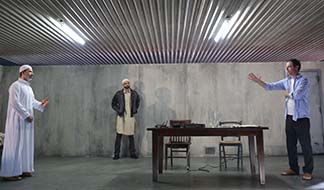
Nick (Justin Kirk) in t-shirt, sometimes covered by an open dress shirt, black pants, and sandals, is a high-level trader at Citibank, Pakistan. Capitalism is in his blood. Handcuffed, he advises a young captor Dar (Jameal Ali), how to arbitrage potatoes when prices differ in regions of the country. Dar buys and sells, makes $75 and deposits it in the western bank.
But Bashir (well played by Usman Ally with an anger heightened by his knowledge of the enemy) is tougher. In his 30s, he is from Hounslow near Heathrow and has a British working class brogue. (He says “init” instead of “isn‘t it.”) He beats Dar because he has opened an account with interest, “which is against Allah‘s will.”
He denounces Citibank for “looting our country, taking water from the people.” The political critiques by the militants in this play are often accurate.
The third character, an Imam (Darlush Kashani) in his 50s, has just been put on a U.S. terrorist list, though he insists, “The Taliban don‘t like us any more than you.” So much for America‘s grasp of Islamic subtleties. He adds, “You‘ve been robbing us blind for 60 years.” Kashani plays him as a man whose anger does not affect his clear-thinking.
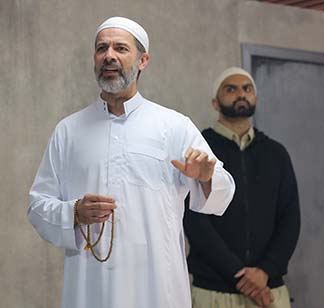
The ransom will be $10 million. Nick argues that he might raise $4 million, but the big number is out of the question. And he‘s worth more alive. He explains that he just made the Azeri family $20 million trading in wheat, taking advantage of price differences in two regions. Suddenly, he finds his talents the only card he‘s got to save his life.
His captors have some education. Bashir took his GCSE finals – high school exams – in England. He says he spent his life being spit on and compares his leaving home to fight abroad to the people who left many countries to fight against Franco. He adds that Ronald Reagan had the Taliban to the White House. He‘s referring to the radical Islamists the U.S. paid to engage the Russians in Afghanistan. Then they turned against their financiers. It‘s called “blowback” and happens when government officials don‘t see too far beyond their noses.
The Imam was a journalist. He wrote about an unusable road for which repairs were paid for over a decade but never used for the road. He was fired and his father murdered. He declares, “We are prisoners of a corrupt country of our making.” He adds, “But you participate. Business‘s job is to plunder.”
He says the president is called Mr. Thirty Percent. It used to be Mr. Ten Percent until he became president.
In fact, Asif Ali Zardari, who had been married to Benazir Bhutto, as co-chair of the Pakistan People‘s Party had been widely known as Mr. Ten Percent. After her assassination in 2007, he was elected president. So maybe his price went up.
(I met Benazir in Pakistan in 1987. She told me she had to be married to be in politics. She sure chose the wrong guy!)
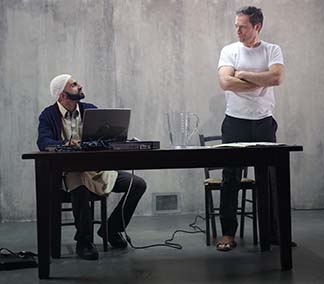
Here‘s where the story gets interesting. Akhtar understands the market trading system. Nick tells his captors he can use the $3 million in his Grand Cayman personal account — note that having a Cayman account means he is hiding income to cheat on U.S. taxes – and that he can build it to the $10 million they demand. He will educate them about short trades and puts and calls.
(A short is when a trader sells a stock or other asset he doesn‘t own, then buys it days later when the price has dropped, delivers it to the buyer, and profits from the spread. A put allows the buyer to sell an asset at a certain price at a future date to the seller. A call is the reverse – allows a person to buy the asset at a certain price at a future date from the seller. The traders hope the market price will be less than the put price or more than the call price. They profit from the difference. It‘s gambling in the Wall Street casino. It‘s how traders make money.)
Nick talks about getting an edge. When Bashir asks him, “If people have it in their interest for a stock to go down, can’t they just do stuff to make it go down?
Nick acknowledges, “When I was working at a hedge fund, we‘d leak word about a stock, sow a rumor or buy a huge position just to get the market to move…But it‘s a short window. The market catches on.” In the short window, some people make a lot of money.
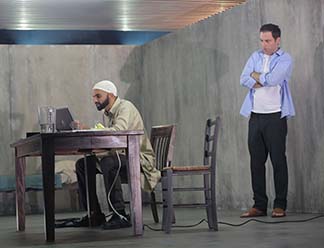
So, here we go with Bashir on an Apple. (Nick is not allowed to use the computer). Bashir tells him he has heard that Lashkar-e-Jhangvi ” the violent Pakistani group that killed journalist Daniel Pearl – plans an attack on the minister of water, whose companies have an interest in water privatization. (Nick hears the murmurs of American drones keeping track of Lashkar.) Nick tells Bashir how to short those companies. They go on line to make the trades.
Then Nick and Bashir hunker down to watch the news wire. Lashkar strikes, the minister is killed along with hundreds of others at his daughter‘s wedding. The two are jubilant. The stocks tank, they buy shares to cover the shorts, and ten minutes later, the ministers‘ powerful friends, who had stock in the companies, protect their investments by forcing the exchange to close. Nick makes $700,000 for his captors.
Shorts are key,” says Nick. “It‘s like an invisible hand.” That of course is Adam Smith‘s meme, the invisible hand that moves the market. Except sometimes it‘s not quite invisible. Prices can be manipulated. Nothing like a well-placed rumor – or a bomb. That predatory U.S. market device will become a murderous tool for the Islamist militants.
Bashir is learning. He declares, “Pakistanis had any sense in their brains, they‘d be tieing the rupee to a basket.” Nick says, “A what?” Bashir, “Basket of currencies.” Seems he downloaded to his iphone Nick‘s Princeton senior thesis on Bretton Woods, which established U.S. domination over the world‘s currencies valued in gold. They get into a debate; Nick says the currency system is a good thing that benefits the world. Bashir refutes that.
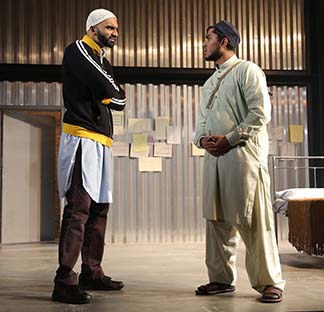
After three months (and a failed attempt at escape), Nick thinks they‘ve made $7 million. But funny things are happening. Some of the money appears to be missing. Has big-money corruption tainted the militants? It may drive a wedge between them. Bashir and Dar are concerned.
Nick‘s captors are not naive. The Imam wonders why Bin Laden was found in a town which was controlled by the military, by General Musharraf. He wonders, “Think about it. The United States had been pouring billions of dollars into the country to find him. For ten years. Billions. Would you give up the very reason all of that money is coming into the country?…And now that he‘s dead? Not even half the money is coming in.”
Bashir has come to see the American as his mentor. He jokes it is the reverse of the Stockholm syndrome. You feel that he gets a high from making money, like those on Wall Street.
Following what Nick taught him about manipulating the market, Bashir pulls off an operation that combines Islamist and market terrorism. a final big trade for which he assures the Pakistani currency will tank. I won’t give away the story of how he does it.
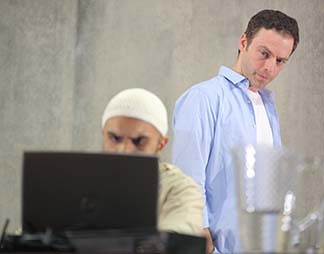
The militant will use what the Citibanker taught him to finance his jihad.
Ayad Akhtar‘s play is a financial thriller of the sort you never expect to see on a New York stage. Akhtar won a Pulitzer Prize last year for “Disgraced,” about ethnic prejudice among liberal New Yorkers. But it‘s nowhere near as good or as interesting as this play, which posits, “What if the enemies of America used the Western financial system to bring it down?”
Director Ken Rus Schmoll makes the militants angry, passionate and quite reasonable in their beliefs. I wondered only at the argumentative tone Nick sometimes took; I would have assumed that a kidnapped banker would be terrified and meek. But for the sake of the drama, there has to be push between him and Bashir.
Islamic militants‘ use of the West‘s trading market as a weapon has been suggested before. There was some evidence after 9/11 that airline stocks had been shorted before the attack. That was never seriously investigated. Perhaps it provoked Akhtar to write this play.
“The Invisible Hand.” Written by Ayad Akhtar, directed by Ken Rus Schmoll. New York Theatre Workshop 79 East Fourth Street, New York City. (212) 279–4200. Tickets $35 to $75. Running time 2 hours. Opened Dec 8, 2014; closes Jan 4, 2015. 12/15/14.

